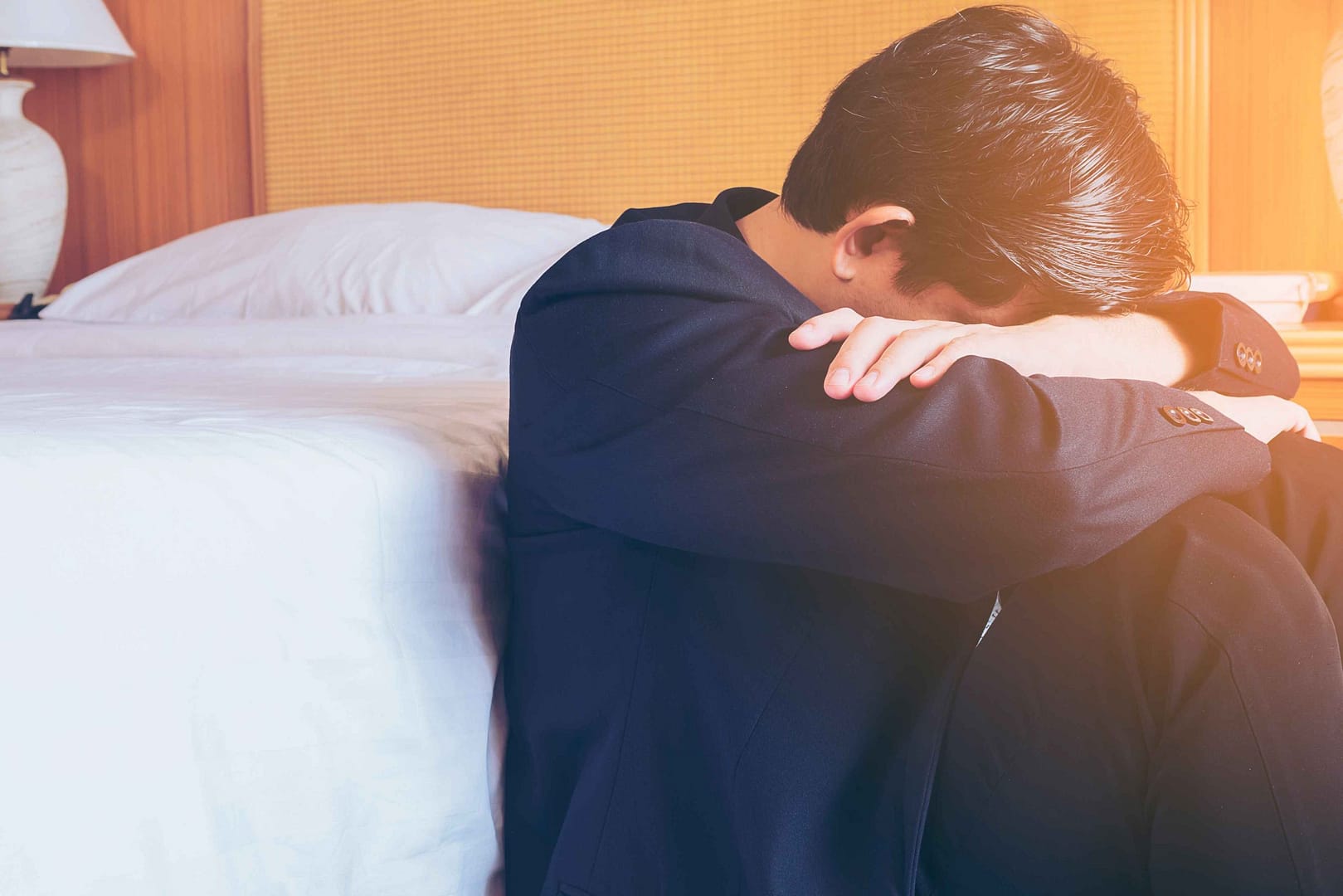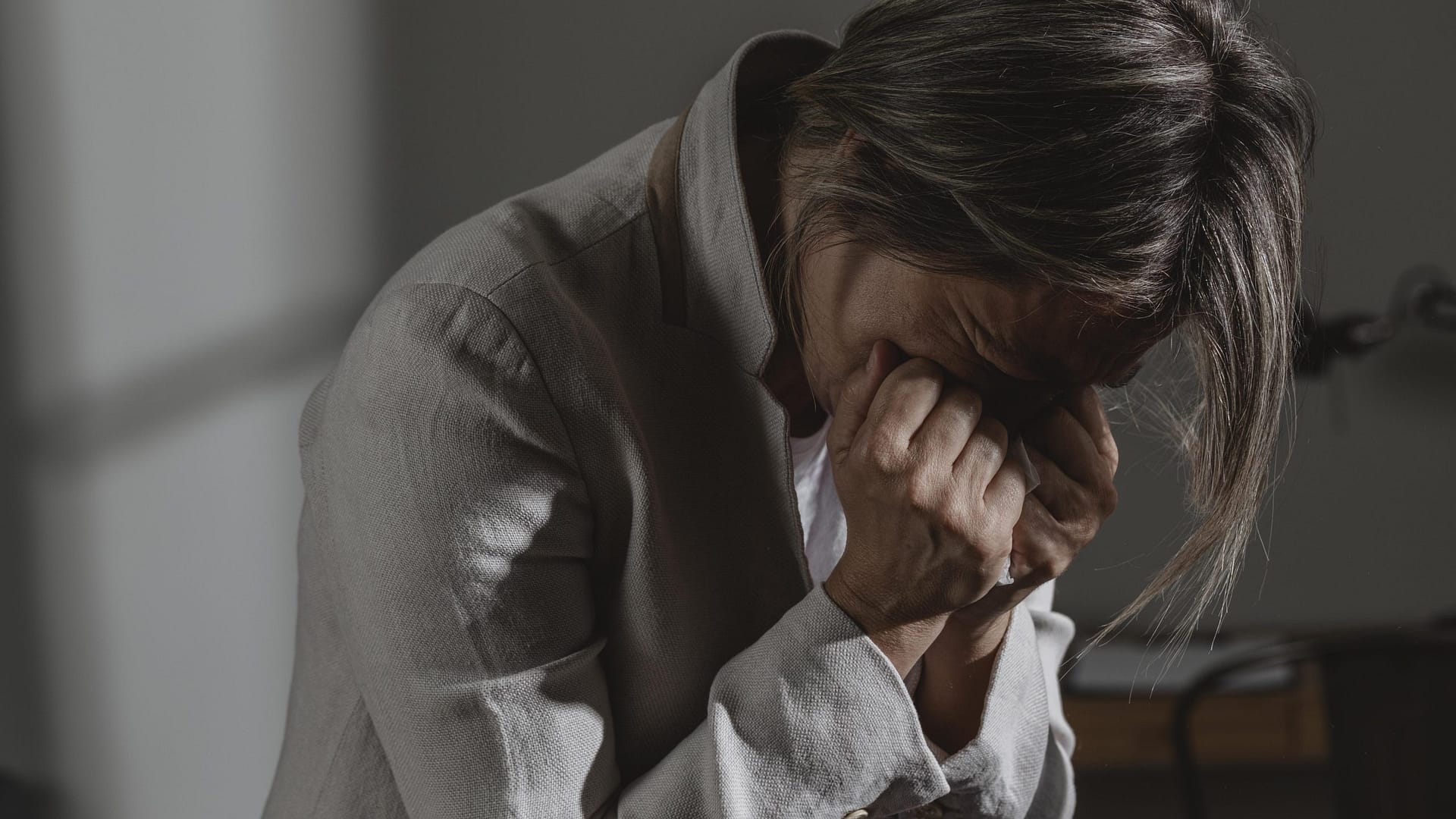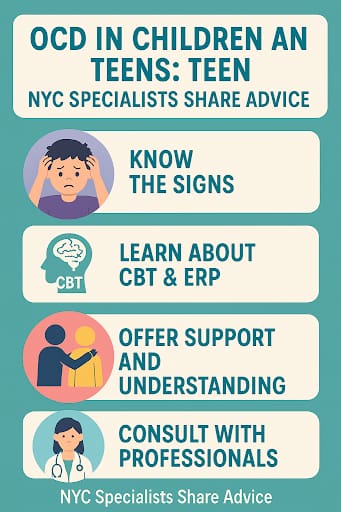
INTRODUCTION
Does your child wash their hands over and over again, assemble or arrange things with inflexible precision, or ask the same questions again and again, even after you have provided them with answers?
On first inspection, these behaviors may appear to be harmless quirks that make your child unique, but they could also be symptoms of Obsessive-Compulsive Disorder (OCD)—a mental health disorder that affects many children and teens. Given the turbulent and high-stakes nature of life in a city like New York, children and teens are at risk for stress-induced disorders.
This blog answers some questions about what OCD looks like in children and teens, how professionals in New York City assess and treat OCD, and what parents can do to help support their child.
What Is OCD in Children and Teen?
Obsessive-Compulsive Disorder (OCD) is a mental health disorder characterized by obsessive thoughts (persistent and intrusive thoughts) as well as compulsive behaviors (repetitive actions or mental acts) performed to relieve the distress caused by obsessive thoughts.
These symptoms can affect a young person’s day-to-day life, such as their school life, friendship groups, family dynamic and overall well-being. Even when adults experience obsessions, they often have some insight into why their actions and thoughts are irrational; however, children often lack insight to understand why they feel compelled to engage in certain behaviors repeatedly.
This confusion and lack of insight can contribute to their distress, frustration and helplessness. If OCD is identified early and is treated early, it may lessen the depth of the disorder by preventing the behaviours and obsessions from being firmly entrenched behaviors as the child gets older.
If unaddressed, OCD can likely negatively impact emotional development and affect self-esteem as they get older. Identifying symptoms of OCD early and treating it properly (with either cognitive behavioural strategies, medication, or both), can allow children to manage their symptoms, build resilience and lead more fulfilling, balanced lives.
Sign and Symptoms of OCD in Children and Teen
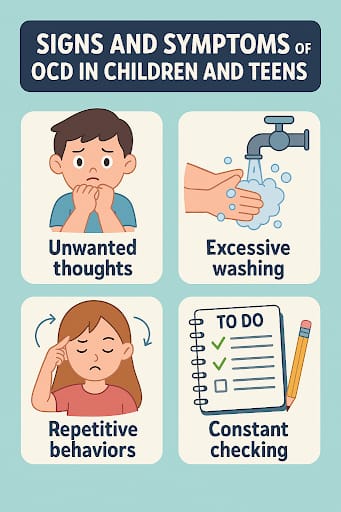
OCD in children and teens can be a challenge, as symptoms might be mistaken for regular developmental behaviors or anxiety. Mental health professionals in NYC emphasize the symptoms of compulsions and obsessions may be normal at times, but when behaviours become sustained with obsessions and compulsions, they should not to be left unaddressed.
- Commonly reported obsessions are fears of germs, contamination, or injury, an extreme need for symmetry, and disturbing intrusive thoughts.
- Common compulsions observed with these obsessions are compulsive cleaning, excessive checking, aligning items with precision, or constant reassurance seeking from others.
These behaviors can occupy many hours of the day, or otherwise disrupt the functioning of daily life. The earlier the identification, and professional evaluation if needed, is reported, the quicker evaluation and/or care can occur.
Why OCD Can Go Unnoticed
Obsessive-compulsive disorder (OCD) in children and adolescents is often overlooked because it can be quite subtle and can easily be mistaken for aspects of their personality or development.
Experts in New York City describe that many children also internalize their compulsions, such as counting in their heads, praying, or repeating phrases, thus, their distress isn’t as easy for parents and teachers to see.
Additionally, OCD often appears alongside other mental health conditions – like anxiety, depression, ADHD, or tic disorders – which complicates diagnosis and the presentation of OCD. The symptoms may disguise the fact the child has OCD, and hinder timely diagnosis and treatment, allowing the condition to become more entrenched over time.
Evidence Based Treatment for OCD in Children and Teen
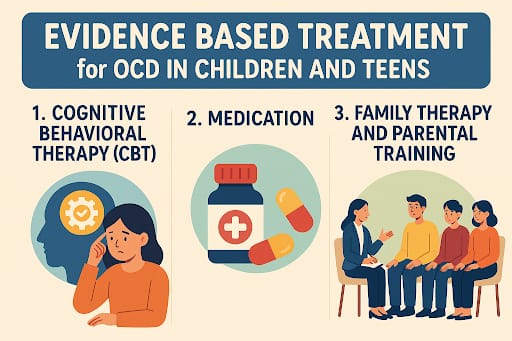
1. Cognitive Behavioral Therapy (CBT)
Cognitive Behavioral Therapy (CBT) is often considered the gold standard in treatment of OCD in kids and teens. More specifically, ERP is a technique used in CBT.
- Basically, ERP exposes the child (in a safe and gradual way) to the obsession (taking germs for example, making a mistake, etc) while helping them resist the accompanying compulsion (being excessively cautious about a germ, checking, washing their hands).
- Through repeated and guided exposure the child slowly desensitized to the anxiety provoked by the obsession, leading to realization that the feared outcome is not probable or is manageable.
- The result of this process both with the obsessions and compulsions, diminishes over time.
2. Medication
In cases where OCD symptoms are particularly severe in children and teens, or when they are not fully responsive to therapy alone, medication may be recommended as part of the intervention plan.
- Medications that regulate serotonin levels in the brain, such as selective serotonin reuptake inhibitors (SSRIs) like fluoxetine or sertraline, can help reduce the frequency/intensity of the obsessive thinking and compulsive behaviors.
- Pediatric psychiatrists in New York City prospectively monitor medications, adjust doses as needed, and they actively involve families into the treatment/discussion at every step to ensure safety and beneficial effects.
- When medications are prescribed in conjunction with Cognitive Behavioral Therapy (CBT), when they are monitored properly, and when families cooperate with recommended dosages and policies, medication can help increase recovery rates and increase treatment outcomes long-term.
3. Family Therapy and Parental Training
Family therapy and parent training are vital to the effective treatment of OCD in children and adolescents. In New York City, we are fortunate to have therapists collaborate closely with parents, educating them about OCD, their role in their child’s recovery, and how to respond to OCD behaviors.
Parents learn how to support their child without accommodating rituals and how to offer emotional support and encouragement. Parental involvement fosters balanced, informed responses and helps create a supportive home environment wherein the child can achieve and maintain sustained improvement.
How NYC School Can Help Children with OCD
Kids with OCD frequently experience both academic and social challenges that call for special support in school.
- Public and private school settings in New York City are required by law to provide children with supports known as 504 Plans or Individualized Education Programs (IEPs), such as time extensions on tests, the opportunity to have tests in a quiet place, and flexible deadlines.
- Most schools also have trained counselors or therapists on staff, who may be aware of OCD or anxiety disorders. Educational and awareness initiatives may help to eliminate stigma and promote early intervention.
- Parents should encourage collaboration with the school staff to obtain necessary support for their child to have the opportunity to succeed educationally and socially.
Parental Guidance - Supporting Your Child Through OCD
Caring for a child with OCD can feel burdensome, but the assistance that is offered in the home is very important to their recovery in the long run.
- Therapists in NYC believe parents should educate themselves on OCD so that parents can learn to differentiate between normal thoughts and worries, and obsessive-compulsive behaviors.
- Patience and non-judgment will be helpful in this process. Parents should refrain from punishing their child’s compulsions and try to appreciate that their child is struggling and use therapy to help as much as possible, such as exposure and response prevention (ERP).
- Another difficulty for parents is not accommodating every one of their child’s rituals, because this can reinforce behavior patterns of OCD.
- Celebrating every achievement may not be what you think, such as preventing a compulsion or completing an exposure, to motivate and empower your child to continue their healing journey.
Final Thought
Obsessive compulsive disorder (OCD) in children and adolescents can be a serious and difficult to treat problem; nevertheless, treatment exists, especially when diagnosed early and properly treated using evidence-based care.
- Effective recovery for children with OCD also means a combination of therapy, possibly medication, and significant involvement by family members.
- By creating a caring, informed and supportive environment at home and school, we can promote the success and wellbeing of the children – demonstrating that OCD can be managed.
- These children do not have to live their lives under the burden of OCD provided they receive the right treatment with the right family involvement.
Reference
- Guastello, A., Merkwae, A., Cooke, D., Olsen, B., & Munson, M. (2021). 504 and IEP Teamwork: Establishing Collaborative Relationships between Mental Health Providers and Educators [Educational]. In 504 and IEP Teamwork: Establishing Collaborative Relationships between Mental Health Providers and Educators. https://psychiatry.ufl.edu/files/2018/08/2018.504-and-IEP-for-children-with-OCD.pdf
- Krebs, G., & Heyman, I. (2014). Obsessive-compulsive disorder in children and adolescents. Archives of Disease in Childhood, 100(5), 495. https://doi.org/10.1136/archdischild-2014-306934
- What are signs of OCD in children and teens? (n.d.). https://www.nationwidechildrens.org/family-resources-education/700childrens/2013/08/what-are-signs-of-ocd-in-children-and-teens
- Freeman, J. B., Choate-Summers, M. L., Moore, P. S., Garcia, A. M., Sapyta, J. J., Leonard, H. L., & Franklin, M. E. (2007). COGNITIVE BEHAVIORAL TREATMENT FOR YOUNG CHILDREN WITH OBSESSIVE COMPULSIVE DISORDER. Biological Psychiatry, 61(3), 337. https://doi.org/10.1016/j.biopsych.2006.12.015
- Medication for pediatric OCD – OCD in kids. (2024, May 20). OCD in Kids. https://kids.iocdf.org/what-is-ocd-kids/how-is-ocd-treated/medication-for-pediatric-ocd/
- Lebowitz, E. R. (2013). Parent-based treatment for childhood and adolescent OCD. Journal of Obsessive-Compulsive and Related Disorders, 2(4), 425-431. https://doi.org/10.1016/j.jocrd.2013.08.004

